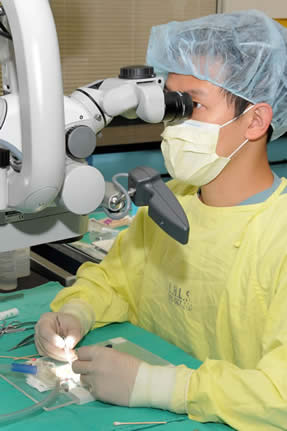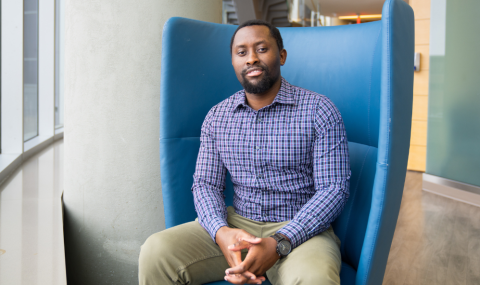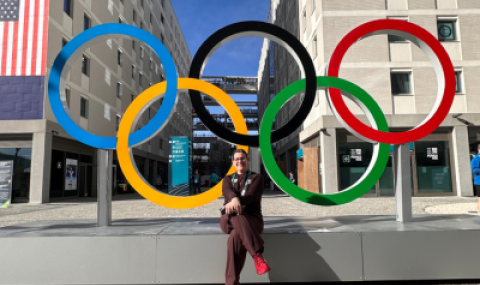
A major factor in kidney rejection and poor long-term outcome is ischemia-reperfusion injury, an inevitable form of early tissue injury that occurs during organ retrieval and transplant surgery. New evidence suggests that “danger” signals, which are released by injured or dying kidney epithelial cells (from the transplant), enhance the immunogenicity of the transplanted kidney by triggering a potent innate immune response. The laboratory of Dr. Lakshman Gunaratnam is studying the potential role of kidney injury molecule-1, a protein that is expressed by the kidney tubular epithelial cells soon after injury, in regulating the innate immune response and preventing rejection. By uncovering the specific mechanisms that enable kidney epithelial cells to control early inflammation after transplant surgery, Dr. Gunaratnam hopes to identify specific strategies that will increase the lifespan of transplanted kidneys.
Dr. Anthony Jevnikar is focused on regulating cellular injury to promote organ survival following transplantation. He has also led the work on novel strategies in oral immune tolerance by creating transgenic plants that express human proteins and can deliver "vaccines" to prevent autoimmune disease and transplant rejection. This work led to the formation of Plantigen Inc., a spin-off company focused on the creation of genetically altered plants for use in medical applications. In recognition of his research contributions, Dr. Jevnikar was awarded the Wyeth/CIHR Chair in Transplantation in 2008.
Chronic injury and premature loss of transplanted kidneys is the greatest current clinical challenge in kidney transplantation. The premature failure of kidney transplants is related to both early rejection and chronic injury of kidney cells by inflammation. This inflammation may be regulated within the transplanted kidney itself. Kidney cells can be eliminated by different "forms" of cell death. Dr. Anthony Jevnikar and Dr. Zhuxu Zhang have discovered that a unique form of kidney death termed "necroptosis" differs from more typical cell death (apoptosis) in that it may lead to increased inflammation within the kidney and contribute to long-term injury. Furthermore, this inflammation can activate harmful Natural Killer (NK) cells, which injure the transplanted kidney and are not affected by current anti-rejection drugs. In the Mailing Centre, they will study how the form of kidney cell death regulates kidney transplant rejection and how NK cells might be controlled. They believe that these studies will guide future clinical therapy of kidney inflammation and may translate into new approaches to prevent kidney transplant injury in patients.
Along with other members of the transplant research group, Dr. Patrick Luke has focused on organ preservation and optimization of kidney transplant function. His research has found that some molecules, such as carbon monoxide-releasing molecules, are capable of preventing cell death, reducing inflammation, and possibly reducing immunologic stress on the transplanted organ. Dr. Luke’s group is dissecting the mechanisms of this agent on a cellular level, while trying to assess its ability to improve organ function and prevent transplant rejection. It is believed that this could reduce organ damage associated with ischemia-reperfusion injury following transplantation. Dr. Luke was recognized in May 2006 as one of “Canada’s Top 40 under 40” for his exceptional achievements.
Dr. Wei-Ping Min’s research focus is transplant immunology. Specifically, his research is looking at interfering with the processing of RNA (also called ‘RNA interference’, RNAi). This is an advanced technology with the potential to stop several disease processes including cancer, autoimmune diseases as well as transplant rejection by silencing gene expression. This is due to the specificity and potency of gene silencing that can be achieved through RNAi as well as avoiding potentially toxic drugs. Dr. Min’s laboratory is the first in the world to apply RNAi to immunomodulation and immunotherapy related to transplantation. By developing and optimizing tissue/cell-specific targeting methods to deliver siRNA, he hopes to develop novel targeted RNAi therapies to prevent tissue injury and graft rejection with the eventual goal of establishing immune tolerance.
Dr. Alp Sener is studying the circumstances that lead to tissue injury. Transplant organs are damaged by the loss of blood supply and the ischemia that occurs during the procurement procedure. The potential benefit of modifying how organs are stored to improve their function has not been intensively investigated. Instead, mainstream approaches to improve transplant survival usually focus on anti-rejection drugs. Other the past 15 years, Dr. Sener has worked with a class of small, endogenously produced molecules that have been implicated in maintaining tissue perfusion. Rooted in his previous findings, Dr. Sener’s research is focusing on developing novel cold kidney perfusion/preservation solutions as well as determining the mechanisms by which hydrogen sulphide and other small molecules may provide cellular protection during organ transplantation. As a result, this strategy may minimize both cold and warm ischemia-induced tissue injury, ultimately improving transplant survival in kidney recipients.
Dr. Zhuxu Zhang is looking at the immune regulatory function of lymphoproliferative double negative (DN) T cells, which can effectively suppress T cell responses and prolong graft survival. Preventing chronic rejection and establishing immune tolerance remain major goals in clinical transplantation. Through Dr. Zhang's work, it is now known that immune regulatory T (Treg) cells exhibit the ability to induce tolerance after transplantation. Further research is focusing on how DN-Treg cells control acute and chronic graft rejection which is initiated by T cells and NK cells. The understanding and development of this novel therapeutic intervention may change the way transplant patients are treated after transplantation.
Training opportunities
Training in various research labs is under the supervision of the respective researchers. Training ranges from summer students to Master’s students, to those working towards their PhD degrees as well as postdoctoral fellows. Many of the PhD candidates and postdoctoral fellows are attracted by the reputation of the individual researchers.
If you are a postdoctoral fellow, as a rule, you must first contact a researcher at Western who shares your research interests and can thus serve as your research supervisor. You need financial support. Typically, you have three options:
- a fellowship from an external agency;
- a fellowship or salary paid through a professor's grants or contracts;
- a fellowship or salary paid by a research unit of the University.
You also need a formal letter of offer from the research supervisor, outlining the nature of the research planned, confirming how you will be paid (fellowship, salary) and providing other relevant details. Check the University of Western Ontario's School of Graduate and Postdoctoral Studies for more information.


